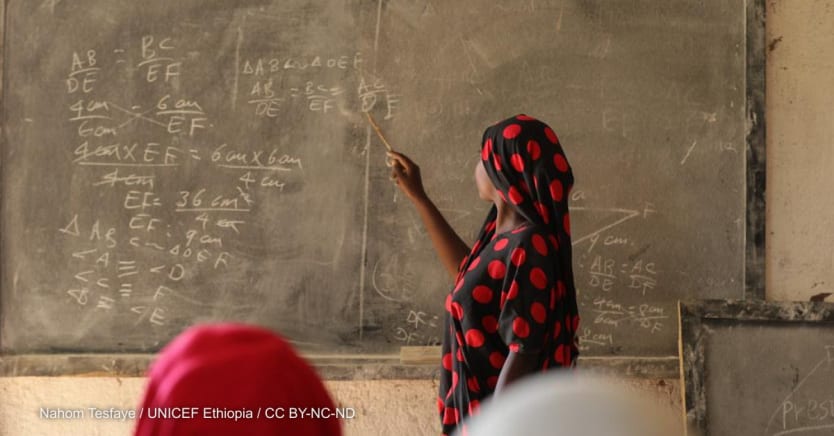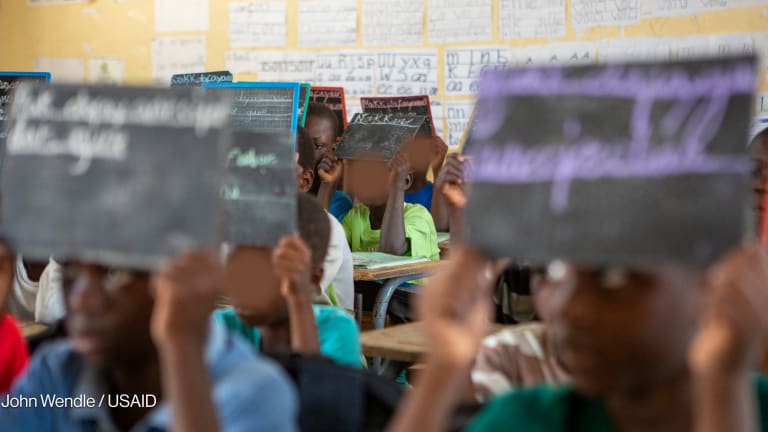Opinion: Avert the global learning crisis by doing less — but better

According to the Big Bang theory, our universe started life 13.8 billion years ago as an infinitesimally small singularity that suddenly inflated at a speed faster than light. It’s that bang that apparently led to us being here right now, and to you reading these words. But wind back 300 years and a second big bang of sorts occurred: the rapid expansion of publicly funded education.
In less than 300 years, we have moved from very limited schooling to universal education in many parts of the world; the majority is funded by taxation. The reason this is brilliant is that education takes you places. The relationship between access to quality schooling and longer life expectancy, greater earnings, and profoundly better outcomes for girls, is long-established and rarely disputed. The reverse leads to the reverse. A two-way street.
But like the actual Big Bang, our local equivalent has led to a patchwork educational universe. Even before the COVID-19 pandemic, an estimated 258 million children were not in school and over 600 million were attending but were getting very little out of it. The pandemic has further tilted the deck. At its peak, more than 1.6 billion children were locked out of education — with the impact being disproportionately felt in low- and middle-income countries that lack access to online learning.
Lengthy pre-service initial teacher training programs that educators undertake before entering the classroom could be significantly shortened, and perhaps even stopped.
—As schools in low-income countries have reopened, many children are just not coming back. Early reports suggest that child work, early marriages, teen pregnancies, and gender-based violence are all on the rise. Other estimates indicate a cumulative lifetime earning loss of $17 trillion for affected children, who will likely be excluded from the global knowledge economy.
This doesn’t happen all at once, but rather “puff-by-puff,” with accumulating decay across the decades. Governments and donors, therefore, need to act fast to get children back to school and learning.
But one of the many unfortunate side effects of the pandemic is that economies and tax receipts have shrunk — with 65% of low- and lower-middle-income countries being forced to cut their education funding. The global education funding gap is estimated to have grown fivefold, to more than $200 billion per year. Our reluctant conclusion is that education systems in LMICs will need to do even more with less — squeezing the pips from whatever they have at hand.
Having just completed the world’s largest systematic review of the evidence on efficiency of impact across these LMICs countries — in our book “The Lean Education Manifesto: A Synthesis of 900+ Systematic Reviews for Visible Learning in Developing Countries” — we have identified how it can be done, although not without side effects.
Our analysis of those systematic reviews of more than 53,000 studies, highlights over 100 things that education systems could potentially remove, reduce, reengineer, or replace — to achieve more efficient impact.
The common reaction when we describe our research findings is a sharp intake of breath.
Our research suggests that those lengthy pre-service initial teacher training programs that educators undertake before entering the classroom could be significantly shortened, and perhaps even stopped.
That teachers do not necessarily need degree-level qualifications in the subjects they teach, and they might not really need degrees at all. And that the hours per week and years of schooling that each child receives could be reduced, or at least not increased — without a negative impact on their learning.
Our lean education manifesto also suggests that children can be taught more effectively in mixed-age classrooms, with peers tutoring one another. That school building could be leveraged morning, afternoon, and evening — why build more schools when you can just turn on the lights? And that different approaches to curriculum, instruction, and the length of the school day might be more cost-effective ways of driving up student achievement than hiring extra teachers, reducing class sizes, or building more classrooms.
The research also suggests that school autonomies, public-private partnerships, and performance-related pay are blind alleys that have limited impact on student outcomes. Such initiatives could potentially be removed or reengineered, with the financial savings reinvested in areas that make the biggest difference.
We are totally in favor of adding more resources. But until it turns up, we advocate for efficient realism in the here and now.
We need to ensure that every child gets to school and that they come out knowledgeable at the other end. And, right now, we can do this best by getting lean and focusing relentlessly on our efficiency of impact.
Search for articles
Most Read
- 1
- 2
- 3
- 4
- 5









